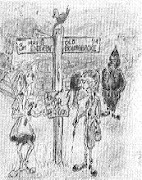
We have made a covenant with death,
And with hell are we in agreement.
These are words from Isaiah (28:15).
And with hell are we in agreement.
These are words from Isaiah (28:15).
The quotation is a good example of the typical form of Hebrew poetry. I'm sure there is a technical term for the practice of saying the same thing twice, using different words. Other examples are:
Thy word is a light unto my path
And a light unto my way. (Psalms 119:105)
There are six things which the Lord hates,
Seven which are an abomination to him. (Proverbs 6:16)
Interesting variation there, with a hint of Monty Python.
Here's a passage I particularly like:
. . .to preserve you from the evil woman,
From the smooth tongue of the adventuress.
Do not desire her beauty in your heart,
And do not let her capture you with her eyelashes;
For a harlot may be hired for a loaf of bread,
But an adulteress stalks an man's very life . . . (Prov 6:24-26).
What are the books that helped the English language to 'set'? The Bible (KJV), Shakespeare's Folio, The Book of Common Prayer, Milton's Paradise Lost, and Bunyan's The Pilgrim's Progress. Maybe Malory as well. I heard Robert Fiske choose it as his book on Desert Island Discs, saying it was the only book that had ever made him cry. Must be a very hard man. Must read it, or try.
I started to think about these things when I picked up John Harris' novel, called Covenant with Death. It is the story of the build-up to the Battle of the Somme, told by one of the volunteers for a 'pal's batallion' raised in a Yorkshire City. Maybe not a great work of literature, but if only I could write as well. He draws a nice contrast between the boyish enthusiasm of the recruits and their growing cynicism. And between the shallow patriotism of those back home who think it's a stroll in the park to 'smash the Hun' and the men at the front, to whom it is a private war against 'Fritz'.
It seems disrespectful really that the only thing from the book that has sent me researching on the internet is the term 'Bradbury'. I should have guessed it meant money, but it didn't hit me until half way through the book. From then it was a short search to discover that the term 'Bradbury' was current from 1914 to1933 and referred to £1 and 10/- notes that bore the signature of Sir John Bradbury.
It's strange how good it felt to write 'ten shillings' like that - 10/-. I haven't done that for over thirty years.
The going up was worth the coming down
Kris Kristofferson

No comments:
Post a Comment